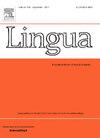意大利语语言群:系统功能视角
IF 1.3
3区 文学
0 LANGUAGE & LINGUISTICS
引用次数: 0
摘要
本文从系统功能语言学的角度对意大利语的语群进行了描述。分析的重点是时态、语态、核性、情态和极性是如何在意大利语动词群中形成的,并通过代词和动词及其变化来实现。该模型首先处理概念意义(时态、语态和核),然后处理人际意义(情态和极性)。我们的论文最后简要介绍了在相关语言(即法语、西班牙语和巴西葡萄牙语)进行的外语研究中可比较的系统和结构。因此,这篇论文解决了罗曼语研究中的一个研究缺口——用意大利语的工作来补充它。本文章由计算机程序翻译,如有差异,请以英文原文为准。
Italian verbal groups: A systemic functional perspective
This paper presents a Systemic Functional Linguistic (SFL) description of the verbal group in Italian. The focus of the analysis is on how tense, voice, nuclearity, modality and polarity are structured in Italian verbal groups and realised via pronominal clitics alongside verbs and their inflections. The model deals first with ideational meaning (tense, voice and nuclearity) and then with interpersonal meaning (modality and polarity). Our paper concludes with a brief note on comparable systems and structures in related languages where SFL studies have been carried out (i.e., French, Spanish and Brazilian Portuguese). The paper thus addresses a research gap in the study of Romance languages – supplementing it with work on Italian.
求助全文
通过发布文献求助,成功后即可免费获取论文全文。
去求助
来源期刊

Lingua
Multiple-
CiteScore
2.50
自引率
9.10%
发文量
93
审稿时长
24 weeks
期刊介绍:
Lingua publishes papers of any length, if justified, as well as review articles surveying developments in the various fields of linguistics, and occasional discussions. A considerable number of pages in each issue are devoted to critical book reviews. Lingua also publishes Lingua Franca articles consisting of provocative exchanges expressing strong opinions on central topics in linguistics; The Decade In articles which are educational articles offering the nonspecialist linguist an overview of a given area of study; and Taking up the Gauntlet special issues composed of a set number of papers examining one set of data and exploring whose theory offers the most insight with a minimal set of assumptions and a maximum of arguments.
 求助内容:
求助内容: 应助结果提醒方式:
应助结果提醒方式:


